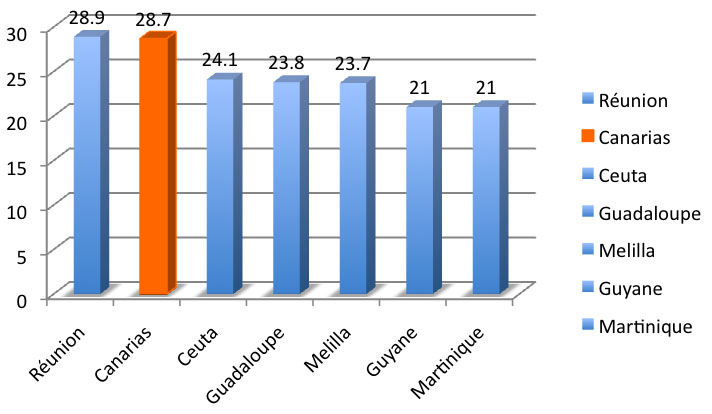
Colonial
unemployment European Union Outermost Regions
Colonial
unemployment rates ranged from 21.0% in Guyane and Martinique to 28.9% and
Mr. Ban Ki-moon, United Nations
Secretary-General
Canary
Islands, 18th, January, 2012. Movimiento por la Unidad del Pueblo
Canario (Movimiento
UPC). The
highest rates were registered in the French Colony of Réunion (28.9%)
and the Noth West Africa Spanish Colony of Canarias (28.7%). Between 2009
and 2010 the unemployment rate rose in nearly two-thirds of the 271 NUTS 22
regions of the EU27.
Among the regions, 32 had an unemployment rate of 4.8%
or less in 2010, half the average for the EU27. They included eight
regions in the
These data on regional unemployment, compiled on the
basis of the EU Labour Force Survey, are published by Eurostat, the
statistical office of the European Union.
The necessary Decolonization and Independence
Female
unemployment rates varied from 24.9% in Guyane to 31.9% in

In the EU27 in 2010 both the male and female
unemployment rates stood at 9.6%. This similarity was also evident at regional
level, with the female unemployment rate being higher than the male rate in 131
regions, the male rate being higher in 128 regions and the rates being equal in
7 regions.
In 2010, the female unemployment rate ranged from 2.5%
in Tirol in
Unemployment rates for young people varied from
5.1% in Oberbayern to 60.2% in
Regional differences in the unemployment rate for young
people are very marked. In the EU27 in 2010, the lowest rates for young
people were recorded in the German regions of Oberbayern (5.1%), Freiburg
(5.4%), and Schwaben (5.5%), and the highest in
Long term-unemployment share varied from 5.0% in
Bucureşti - Ilfov to 78.8% in
The
long-term unemployment share, which is defined as the percentage of unemployed
persons who have been unemployed for 12 months or more, varied significantly
across the regions. In the EU27 in 2010, the lowest shares of long-term
unemployed were recorded in Bucureşti-Ilfov (5.0%) in
United
Nations Secretary-General Ban Ki-moon said that 2010 would be an important year
for the Special Committee on Decolonization because it marked both the end of
the Second International Decade for the Eradication of Colonialism and the
fiftieth anniversary of the Resolutión 1514
(XV), December 14th, 1960, Declaration On The Granting Of Independence To
Colonial Countries And People.
“What
we need now are creative solutions for the remaining Non-Self-Governing
Territories”, said Ban Ki-moon.
Under
Chapter VII of the United Nations Charter, the Security Council can take
enforcement measures to maintain or restore international peace and security.
Such measures range from economic and/or other sanctions not involving the use
of armed force to international military action.
The use of mandatory sanctions is intended to apply pressure on a State or entity to comply with the objectives set by the Security Council without resorting to the use of force. Sanctions thus offer the Security Council an important instrument to enforce its decisions. The universal character of the United Nations makes it an especially appropriate body to establish and monitor such measures.
